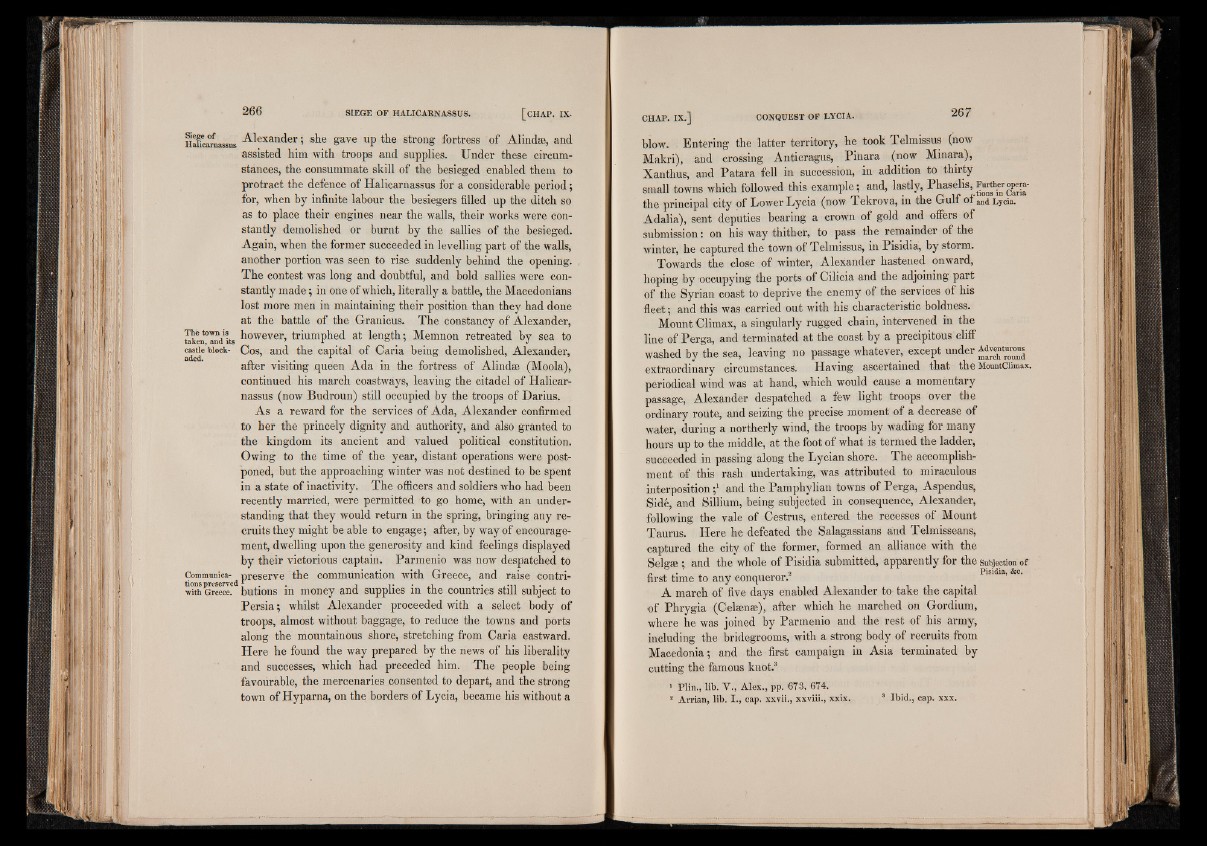
HaMcamassos Alexander; she gave up the strong fortress of Alindse, and
assisted him with troops and supplies. Under these circumstances,
the consummate skill of the besieged enabled them to
protract the defence of Halicarnassus for a considerable period;
for, when by infinite labour the besiegers filled up the ditch so
as to place their engines near the walls, their works were constantly
demolished or burnt by the sallies of the besieged.
Again, when the former succeeded in levelling part of the walls,
another portion was seen to rise suddenly behind the opening.
The contest was long and doubtful, and bold sallies were constantly
made; in one of which, literally a battle, the Macedonians
lost more men in maintaining their position than they had done
at the battle of the Granicus. The constancy of Alexander,
teken°andits h°wever> triumphed at length; Memnon retreated by sea to
castle block- Cos, and the capital of Caria being demolished, Alexander,
after visiting queen Ada in the fortress of Alindse (Moola),
continued his march coastways, leaving the citadel of Halicarnassus
(now Budroun) still occupied by the troops of Darius.
As a reward for the services of Ada, Alexander confirmed
to her the princely dignity and authority, and also granted to
the kingdom its ancient and valued political constitution.
Owing to the time of the year, distant operations were postponed,
but the approaching winter was not destined to be spent
in a state of inactivity. The officers and soldiers who had been
recently married, were permitted to go home, with an understanding
that they would return in the spring, bringing any recruits
they might be able to engage; after, by way of encouragement,
dwelling upon the generosity and kind feelings displayed
by their victorious captain. Parmenio was now despatched to
Commnmca- preserve the communication with Greece, and raise contri-
thi Greece!*1 buttons in money and supplies in the countries still subject to
Persia; whilst Alexander proceeded with a select body of
troops, almost without baggage, to reduce the towns and ports
along the mountainous shore, stretching from Caria eastward.
Here he found the way prepared by the news of his liberality
and successes, which had preceded him. The people being
favourable, the mercenaries consented to depart, and the strong
town of Hyparna, on the borders of Lycia, became his without a
blow. Entering the latter territory, he took Telmissus (now
Makri), and crossing Anticragus, Pinara (now Minara),
Xanthus, and Patara fell in succession, in addition to thirty
small towns which followed this example; and, lastly, PhaseHs. Furtheropera-
the principal city of Lower Lycia (now Tekrova, in the Gulf of and Lycia.
Adalia), sent deputies bearing a crown of gold and offers of
submission: on his way thither, to pass the remainder of the
winter, he captured the town of Telmissus, in Pisidia, by storm.
Towards the close of winter, Alexander hastened onward,
hoping by occupying the ports of Cilicia and the adjoining part
of the Syrian coast to deprive the enemy of the services of his
fleet; and this was carried out with his characteristic boldness.
Mount Climax, a singularly rugged chain, intervened in the
line of Perga, and terminated at the coast by a precipitous cliff
washed by the sea, leaving no passage whatever, except under
extraordinary circumstances. Having ascertained that the MountChmax.
periodical wind was at hand, which would cause a momentary
passage, Alexander despatched a few light troops over the
ordinary routes, and seizing the precise moment of a decrease of
water, during a northerly wind, the troops by wading for many
hours up to the middle, at the foot of what is termed the ladder,
succeeded in passing along the Lycian shore. The accomplishment
of this rash undertaking, was attributed to miraculous
interpositionand the Pamphylian towns of Perga, Aspendus,
Sidé, and Sillium, being subjected in consequence, Alexander,
following the vale of Cestrus, entered the recesses of Mount
Taurus. Here he defeated the Salagassians and Telmisseans,
captured the city of the former, formed an alliance with the
Selgee ; and the whole of Pisidia submitted, apparently for the subjection o f
» . . 2 Pisidia, &o. first time to any conqueror.
A march of five days enabled Alexander to take the capital
of Phrygia (Celsenae), after which he marched on Gordium,
where he was joined by Parmenio and the rest of his army,
including the bridegrooms, with a strong body of recruits from
Macedonia; and the first campaign in Asia terminated by
cutting the famous knot.3
1 Plin., lib. V., Alex., pp. 673, 674.
* Arrian, lib. I | cap. xxvii., xxviii., xxix. 8 Ibid., cap. xxx.